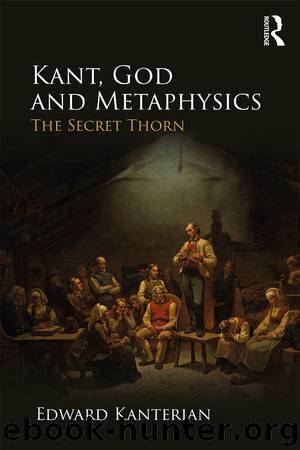Kant, God and Metaphysics by Kanterian Edward;

Author:Kanterian, Edward;
Language: eng
Format: epub
Publisher: Routledge
Published: 2017-10-30T16:00:00+00:00
p.218
Wood advances an interesting consideration: ‘On Kant’s behalf it might be replied that the actual existence of things suffices to show it impossible that there should be a necessarily empty world.’104 This conclusion can be reached even without accepting Kant’s account of the data of possibility (the Modal Principle). If there were no possible object, the world would be necessarily empty. But since the actual existence of things, in this world, entails their possibility, it is false that there could be a necessarily empty world.105 This, however, is a weaker claim than Kant’s. Kant’s claim is not premised on the existence of things. It is simply that it is impossible that nothing exists, from which it follows that necessarily something exists. Even if we can show that it is impossible that necessarily there could have been nothing, this does not exclude that there could have been nothing.
Wood then suggests that Kant’s actual claim, that something necessarily exists, can be proven formally. To do this we need to accept not only the premise ‘Possibly something exists’, but also Kant’s account of the data of possibility. ‘Possibly something exists’ is taken by Wood in the de re reading, as ‘it is necessarily true that the world is not empty’. Valuable as this approach is, the non-empty world interpretation does not help Kant, since he is not merely interested in proving that the world could not have been empty. That would merely show that some possible object in the world had to exist. But any object in the world is a created object, as is the world as a whole, on Kant’s theistic view. Kant wants to prove the existence of God, and God is not an object in the world or identical to a world. Kant needs the premise that it is impossible that there should have been no possibility whatsoever. At any rate, Wood’s ingenious formalisation of Kant’s proof uses first order propositional modal logic.106 Take ‘P’ to stand for ‘Something exists’.
Argument III
(1) ◊P ⇒ P (or □(◊P → P))107 Kant’s Modal Principle
(2) ◊P → □◊P modal logic axiom
(3) P ⇒ ◊P modal logic axiom108
(4) P ↔ ◊P 1, 3
(5) (□Q & (Q ↔ R)) → □R logical truth
Download
This site does not store any files on its server. We only index and link to content provided by other sites. Please contact the content providers to delete copyright contents if any and email us, we'll remove relevant links or contents immediately.
The remains of the day by Kazuo Ishiguro(8965)
Tools of Titans by Timothy Ferriss(8360)
Giovanni's Room by James Baldwin(7316)
The Black Swan by Nassim Nicholas Taleb(7101)
Inner Engineering: A Yogi's Guide to Joy by Sadhguru(6785)
The Way of Zen by Alan W. Watts(6592)
Asking the Right Questions: A Guide to Critical Thinking by M. Neil Browne & Stuart M. Keeley(5751)
The Power of Now: A Guide to Spiritual Enlightenment by Eckhart Tolle(5743)
The Six Wives Of Henry VIII (WOMEN IN HISTORY) by Fraser Antonia(5493)
Astrophysics for People in a Hurry by Neil DeGrasse Tyson(5172)
Housekeeping by Marilynne Robinson(4434)
12 Rules for Life by Jordan B. Peterson(4298)
Double Down (Diary of a Wimpy Kid Book 11) by Jeff Kinney(4257)
The Ethical Slut by Janet W. Hardy(4240)
Ikigai by Héctor García & Francesc Miralles(4235)
Skin in the Game by Nassim Nicholas Taleb(4232)
The Art of Happiness by The Dalai Lama(4120)
Skin in the Game: Hidden Asymmetries in Daily Life by Nassim Nicholas Taleb(3986)
Walking by Henry David Thoreau(3950)
